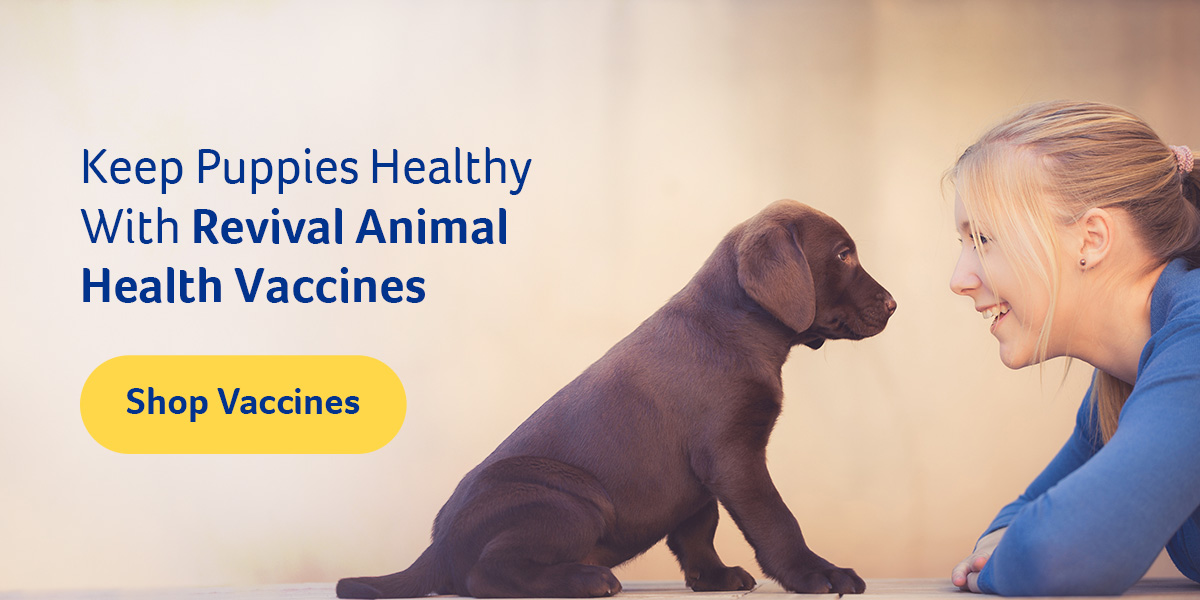Raising a puppy is exciting and rewarding. To ensure your puppy’s health, you need to maintain a proper puppy vaccination schedule. The earliest you can take a puppy home is 8 weeks, but they are not fully vaccinated at that age. You will have to continue with puppy shots until they are at least 16 to 18 weeks old and then get booster shots every one to three years.
But how many shots does a puppy need and how do you know when puppies are fully vaccinated? We have broken down the puppy vaccination schedule and the disease they protect against in this easy guide.
How Many Vaccinations Do Puppies Need?
Preventing dogs from contracting certain diseases can save their lives. Your puppy needs eight vaccines by the time they are 4 months old. Four are required, or core vaccines, while four are optional, or non-core. Each vaccine helps your puppy develop the immunity needed to prevent potentially life-threatening diseases. Remember that vaccinations focus on preventing infections. They will not automatically make your pet healthy. You still need to provide your puppy with the proper diet and ensure they are getting enough exercise.
The four core vaccinations protect puppies from canine distemper, canine hepatitis, canine rabies and canine parvovirus (CPV) — diseases they will encounter regardless of their breed, size or location.
Canine distemper, CPV and hepatitis are given on the same schedule. The first shot is given at 6-8 weeks, followed by shots every two to four weeks until puppies are 4 months old. Boosters are given at 1 year old and then every three years. Rabies vaccinations depend on the laws of your state, but most puppies need to get their first shot at 3 months with boosters annually or every three years.
Optional vaccinations are for bordetella, Lyme disease, leptospirosis and canine influenza. Dogs might not encounter these diseases, but if they do, they can be deadly, costly to treat and have long-lasting effects. The four optional vaccinations and their schedules are as follows:
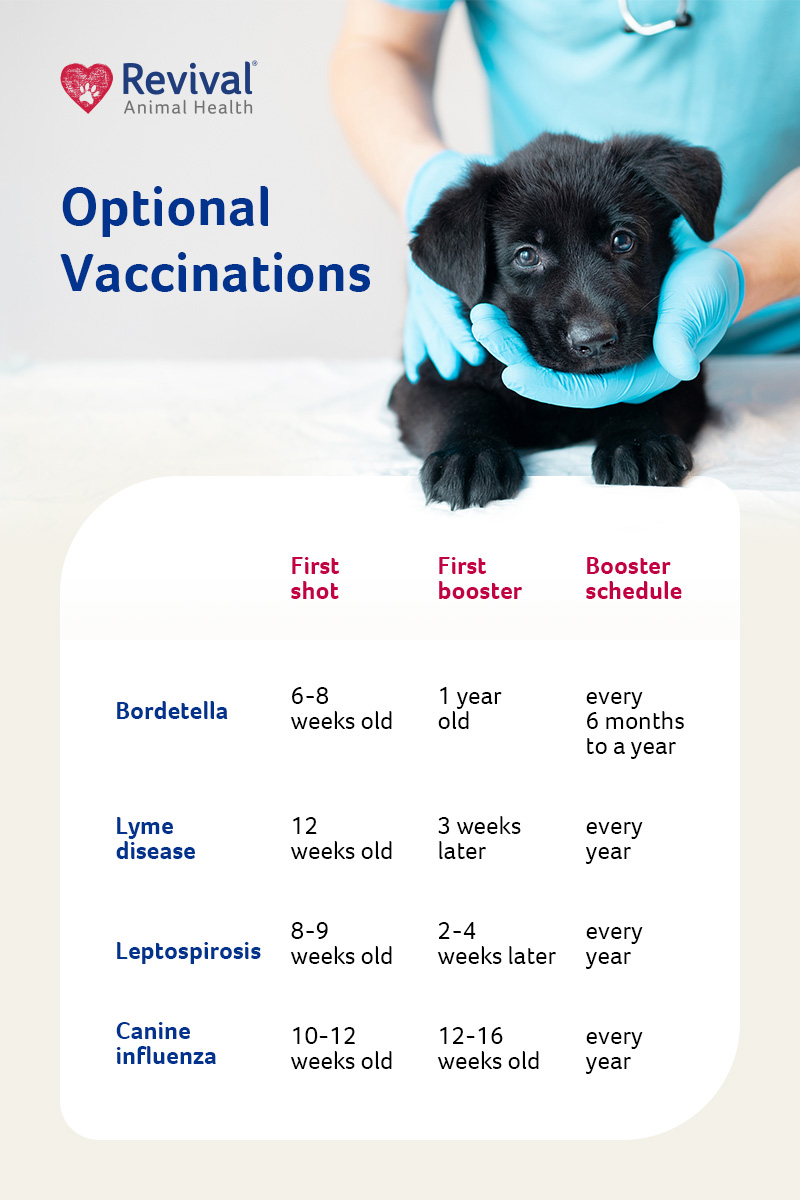
-
- Bordetella: The first shot is given at 6-8 weeks, with a booster at 1 year old. Puppies get a booster every six months to a year.
- Lyme disease: Puppies receive the initial shot at 12 weeks old and get a booster three weeks later. They need annual boosters after that.
- Leptospirosis: This vaccine is a two-shot dose with the first shot given at 8-9 weeks and a follow-up shot given two to four weeks later. Dogs receive annual boosters.
- Canine influenza: Vaccination starts at 10 to 12 weeks, with a booster at 12-16 weeks. Like people, dogs should receive an annual flu shot.
By 4 months old, puppies should have most of their vaccinations. Puppies are considered fully vaccinated once they have all their core vaccinations and subsequent boosters, generally at about 1 year old.
Why Do Vets Recommend So Many Vaccines?
When puppies are first born, they rely on the antibodies provided in their mother’s milk to protect them from diseases. However, this protection fades over time as puppies develop their immune systems, leaving them vulnerable to deadly diseases. A puppy vaccination schedule ensures puppies get the necessary shots to build immunity to potentially life-threatening conditions.
Eight vaccines might sound like too much for a puppy, but many required vaccines are combined into one shot. The DHPP or DA2PP puppy shot is a five-way vaccination that helps protect puppies from canine distemper, canine hepatitis/adenovirus, parainfluenza and parvovirus. Puppies can get the DA2PP-L shot, which also includes the leptospirosis vaccine, or the DA2PP-C vaccine, which includes the vaccine for canine coronavirus. Combined vaccines are very effective, save puppies additional shots and can contain optional vaccines for enhanced protection.
Vets recommend each vaccine as it can save your puppy’s life. The statistics show just how deadly many of these diseases are:
- Canine distemper: This disease is fatal for 50% of unvaccinated adult dogs and 80% of unvaccinated puppies.
- Canine hepatitis: The mortality rate for canine hepatitis ranges from 10-30% but is highest in puppies.
- Canine leptospirosis: Leptospirosis has a 29% mortality rate in dogs, but that rate can rise in young dogs.
The rabies vaccine is the only vaccine mandated by law. It has a mortality rate of nearly 100% in animals and humans but is preventable through strict vaccination schedules.
The Four Core Puppy Vaccines
Puppies must be vaccinated against four diseases — canine distemper, CPV, canine hepatitis and rabies. Puppies start receiving shots for these diseases as early as 6 weeks old. Vets highly recommend these vaccines as the diseases they prevent can be fatal and pose a high public health risk in the case of rabies.
Canine Distemper
Canine distemper targets dogs’ respiratory, gastrointestinal and nervous systems. Distemper can be fatal. The dogs who survive often have permanent nervous system damage. It is also contagious and is usually spread through the air by infected animals, wild and domestic. When puppies share food, water bowls or other equipment, they can also be infected, as infected animals can spread the disease for months. Distemper can also pass to puppies via a mother’s placenta.
Some symptoms of canine distemper include:
- Watery, pus-like discharge from their eyes
- Fever
- Nasal discharge
- Coughing
- Reduced appetite
- Vomiting
- Circling behavior
- Convulsions
- Seizure
- Partial or complete paralysis
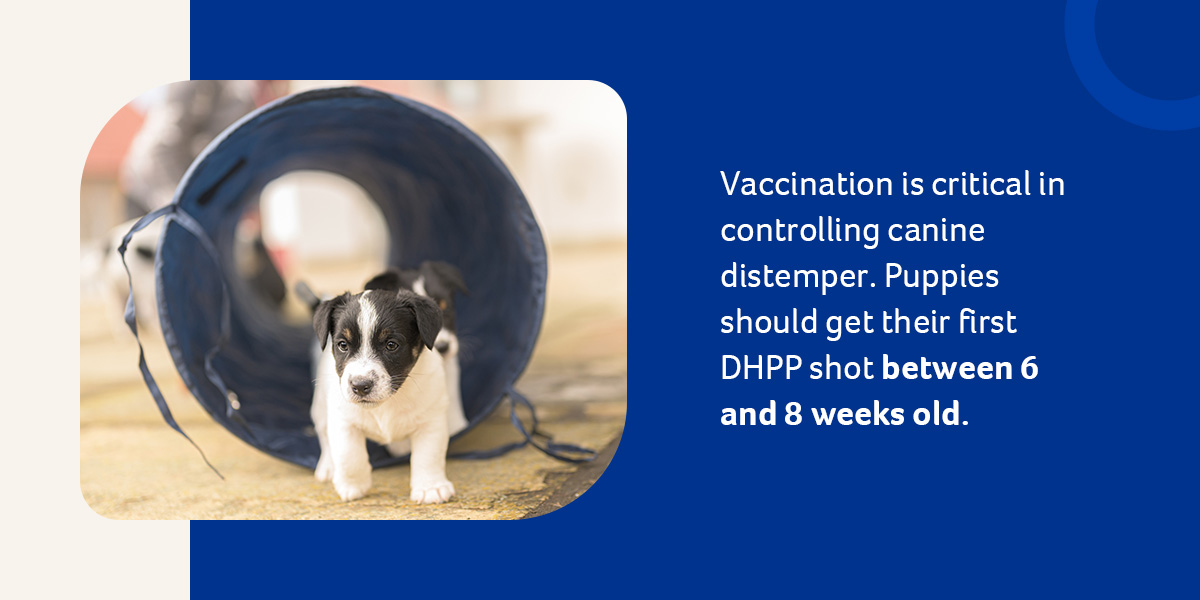
Currently, there is no cure for distemper, and most treatment focuses on preventing infections that can accompany the disease and controlling vomiting, diarrhea and other neurological symptoms. It is also essential to avoid dehydration by administering fluids.
Vaccination is critical in controlling canine distemper. Puppies should get their first DHPP shot between 6 and 8 weeks old. After that, puppies get a shot every two to four weeks until they are 4 months old. In areas with a high canine distemper risk, vaccinations can continue until puppies are 5 months old to prevent infection. A booster shot should be given to the puppy when they are 1 year old and every three years after that.
Vaccines stimulate the immune system and can cause dogs to experience soreness and fever, but these symptoms are infrequent, and most puppies don’t experience any side effects.
Canine Parvovirus
Puppies between the ages of 6 weeks and 6 months are highly susceptible to CPV, a highly contagious and fatal viral disease. Older dogs are sometimes affected by the disease. However, it is far more prevalent in puppies. The disease generally attacks dogs’ intestines. In some instances, it can attack the heart muscles of very young puppies.
CPV is a hardy virus found in nearly every environment, making it difficult to eliminate. Depending on a puppy’s immune system and how many viruses they are exposed to, they might not contract the disease. If they do catch canine parvovirus, it can be fatal.
Anorexia, depression, vomiting and diarrhea are the most commons sign of CPV. Any puppy with gastrointestinal issues needs to be treated as if they have CPV, as a delay can cost them their life. Treatment is extensive and will require a hospital stay so puppies can receive IV fluids and nutrients. Infected puppies need several medications and supportive care to ensure they are comfortable, giving them the best chance of survival.
With the proper treatment, parvovirus has a survival rate of up to 90%. If left untreated, the mortality rate can be just as high. Vaccinations are critical to preventing parvovirus, and puppies should get their first DHPP shot between 6 and 8 weeks. From there, they should get a shot every two to four weeks until they are 4 months old. Boosters are given at 1 year old and then every three years.
Puppies rarely react to the parvovirus vaccination, but they may experience pain, lethargy, anorexia and tenderness at the site up to three days after the vaccination. These symptoms are usual and should resolve themselves within 24 hours. Smaller dogs appear more susceptible to reacting to the vaccine, so it is crucial to monitor your puppy for any reactions and update your vet on any changes.
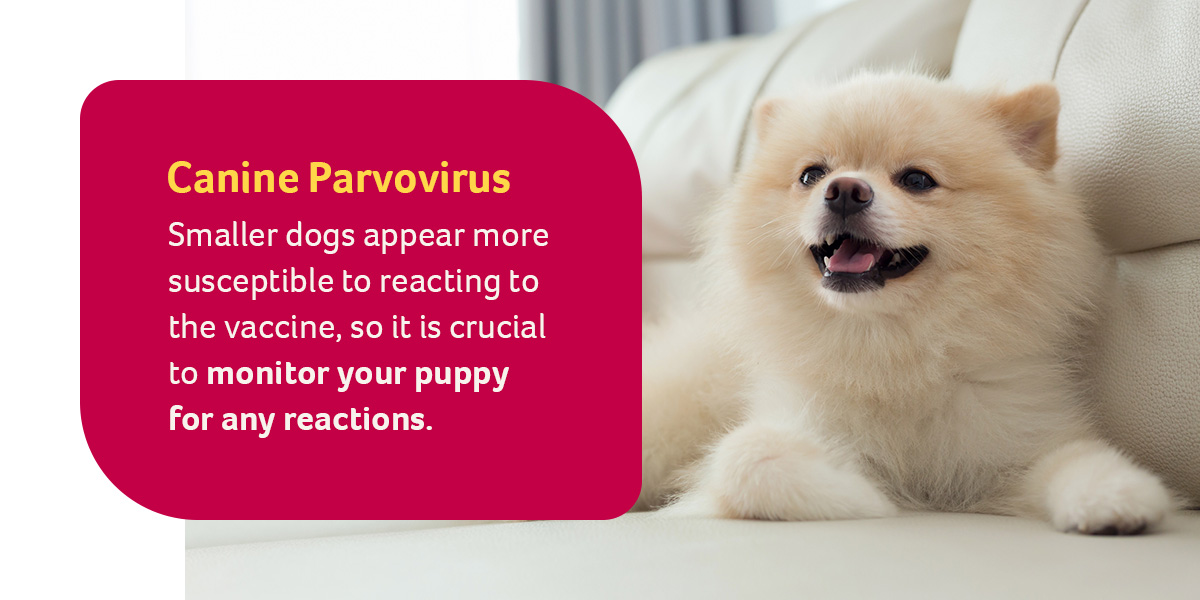
Canine Hepatitis
Canine hepatitis or adenovirus affects puppies and grown dogs. Adult dogs are more resistant to the disease and often don’t present symptoms. Puppies have a higher risk of contracting the virus, and it is often fatal for young dogs. Canine hepatitis spreads through contact with objects contaminated by urine, saliva and feces.
Signs of canine hepatitis occur within two to five days of exposure. Incubation can be up to 14 days before clinical symptoms appear.
Early signs of canine hepatitis can be similar to distemper and include:
- Fever
- Depression
- Loss of appetite
- Abdominal pain
- Diarrhea
- Fluid build-up under the skin (edema) of the head and neck
- Jaundice
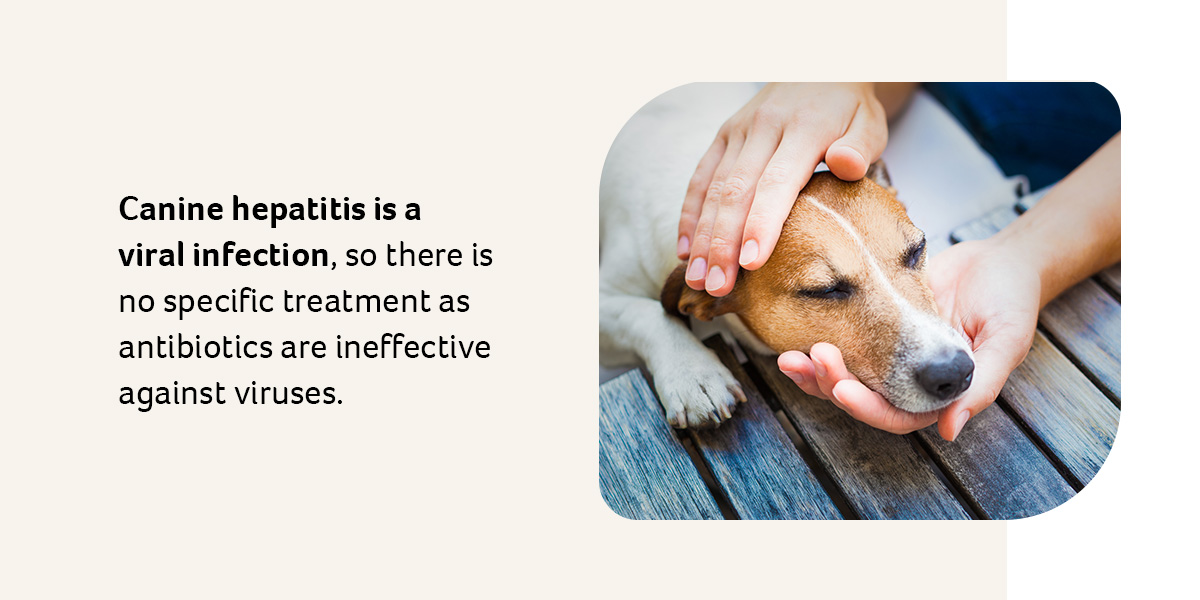
Canine hepatitis is a viral infection, so there is no specific treatment as antibiotics are ineffective against viruses. However, antibiotics may be used if secondary bacterial infections occur. It is important to give a puppy’s immune system time to combat the virus, so treatment focuses on managing symptoms and secondary infections. You should take your puppy to the vet to receive intravenous fluids and support care for any severe symptoms.
The best way to prevent hepatitis is by getting the DHPP puppy shot. As puppies reach the age of 8 weeks, they start building their immune systems and stop relying on the immunity from their mother’s milk. Puppies receive a hepatitis vaccination every two to four weeks until they are 4 months old. Booster shots are given at 1 year old and then every three years to maintain their immunity.
Puppies can experience mild reactions to the vaccine, including tiredness, stomach issues and swelling at the vaccination site. These reactions are mild and will resolve themselves over time. Ensure your vet is aware of any responses, especially if they persist.
Canine Rabies
Rabies is well-known as a deadly virus that attacks the nervous system. Once symptoms appear, the disease is almost always fatal. The high mortality rate and public health risk mean rabies vaccinations are mandated by law.
Rabies spreads through the saliva of infected animals, and many wild animals are known to be disease carriers. It can take up to a month for symptoms to develop as the virus travels from an infected site to the brain.
Symptoms of rabies include:
- Aggression
- Foaming at the mouth or drooling
- Abnormal affection
- Staggering
- Seizures
- Reckless behavior or fearlessness
There are two ways the virus can present — furious or paralytic. Furious rabies is the stereotypical presentation of aggression and drastic behavioral changes. Paralytic rabies is different in that dogs show a loss of coordination and weakness instead. Both can be fatal.
Due to the severity of the disease, there is no cure for rabies. Treatment for vaccinated animals includes treating the site of infection to prevent the spread of the disease, revaccination and quarantine. If a dog is not vaccinated, they need to be placed into isolation immediately for observation, or they may need to be euthanized.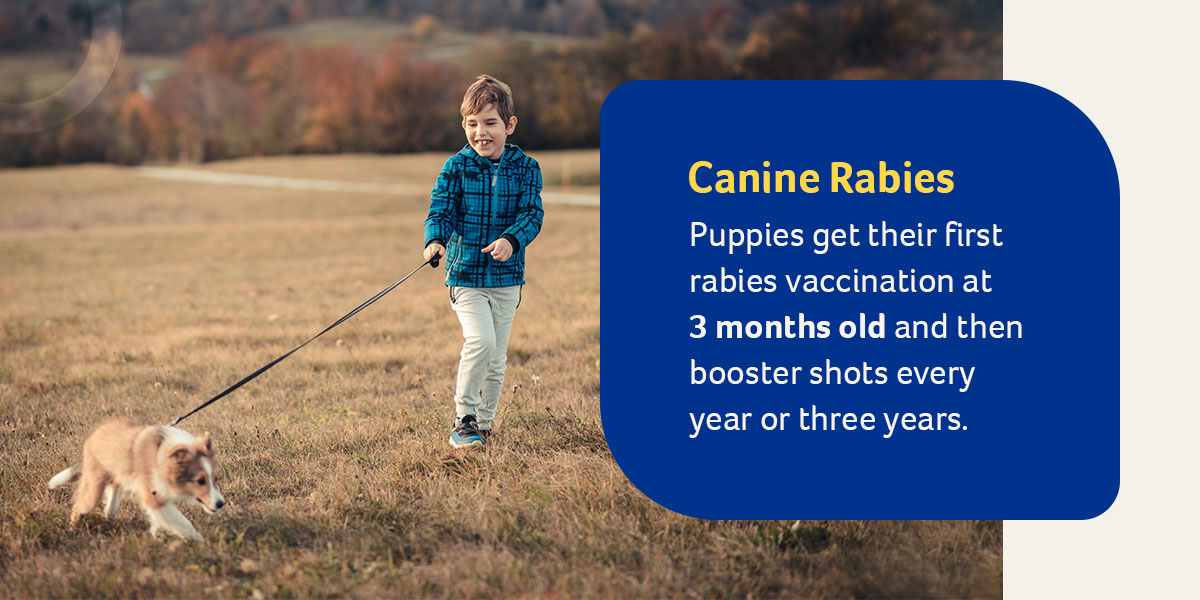
Thankfully, vaccinations are an effective way to prevent the disease. Puppies get their first rabies vaccination at 3 months old and then booster shots every year or three years. It is important to check your local laws about rabies vaccination. Some regions require rabies vaccination before 3 months of age.
As with any vaccination that stimulates a puppy’s immune system, there may be some mild side effects. A mild fever, tiredness and soreness at the injection site are the most common reactions and typically go away within 48 hours. Some puppies may have an allergic reaction to the vaccine and present with facial swelling and hives or start vomiting. Contact your vet immediately if this occurs. Allergic reactions are not very common, and the rabies virus is safe for all puppies.
Optional Puppy Vaccines
In addition to the four core vaccinations for puppies, there are four other optional vaccinations for bordetella, leptospirosis, Lyme Disease and canine influenza. While these vaccinations are optional, there are many benefits to getting them. By preventing these diseases, you ensure your puppy’s health. All four conditions can also cause complications in other illnesses, resulting in a higher mortality rate.
As with the four core vaccinations, a set schedule for the optional vaccinations provides the best protection for your puppy.
Bordetella
Bordetella, also called kennel cough, is an infectious disease that affects dogs’ respiratory systems. It’s not fatal but can last up to three weeks, causing discomfort and pain.
Dogs contract the disease when exposed to bacteria from other dogs. Bordetella is highly contagious and spreads quickly. Many dogs get bordetella at a kennel, which is where it gets its common name. Other places dogs can be exposed to the disease include at the groomer, dog parks and veterinary clinics.
The treatment for kennel cough includes using antibiotics and cough suppressants. Vaccination is required to prevent the disease as it helps develop ”herd immunity’‘ so there are fewer new cases.
There are three ways to vaccinate puppies against kennel cough:
- Injectable vaccine: This is a puppy shot under the skin with a needle.
- Intranasal vaccine: This option is dripped or squirted into the nose, causing the production of antibodies in the respiratory tract.
- Oral vaccine: This version is dripped or sprayed into the mouth and stimulates an immune response in the respiratory tract.
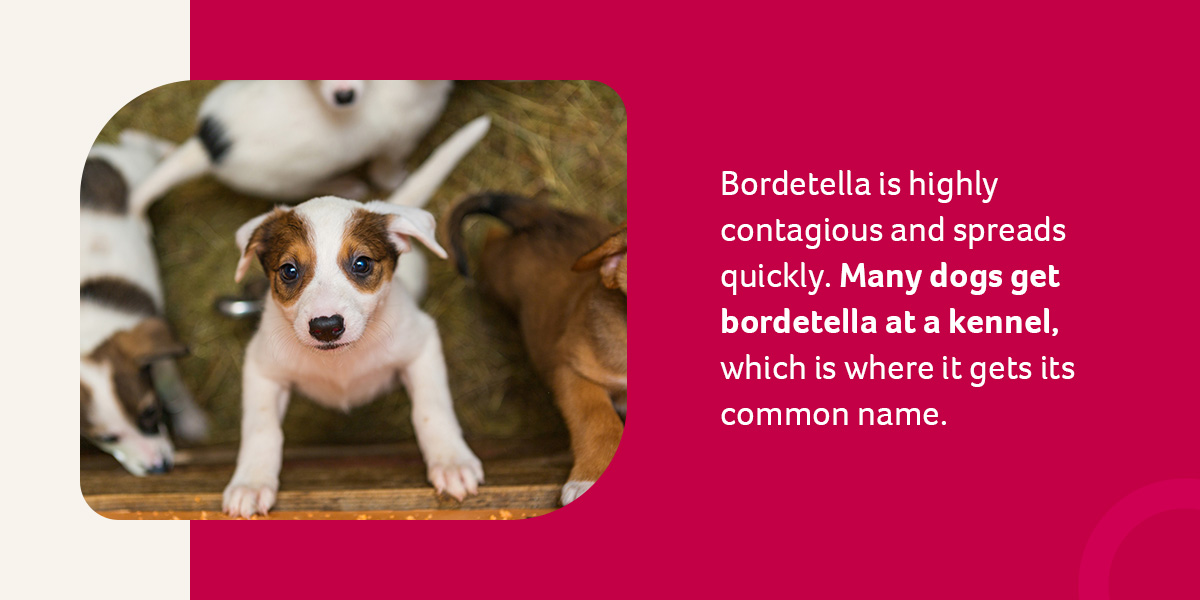
Puppies should get their first bordetella vaccine at 6-8 weeks. A booster is given a year after that, then every six months or annually, depending on your dog’s risk factors and lifestyle. Dogs have mild reactions to these vaccines, including being more tired than usual as their bodies work to create immunity. They may experience discomfort or pain if they receive the injectable vaccine, but these reactions will normally resolve within 48 hours. If they don’t, contact your vet.
Leptospirosis
Leptospirosis is a bacteria that causes kidney and liver issues in puppies and can result in embryo death or late-term miscarriages in pregnant dogs. It can also be fatal for puppies and younger dogs without a mature immune system. Wild animals such as raccoons and rodents carry the disease but do not present with any symptoms.
Any infected animal can spread the disease through their urine. Water contaminated by urine is the primary source of leptospirosis since the bacteria can’t survive in dry environments. Other sources of infection include urine-contaminated oil, bedding or food. A bite from an infected animal or eating infected carcasses can also spread the disease.
Symptoms of leptospirosis include:
- Lethargy
- Muscle and joint pain
- Dehydration
- Vomiting
- Bleeding
- Jaundice
Treatment is straightforward in most cases, with dogs being put on drips, antibiotics and sometimes blood transfusions. The vaccination protects dogs for 12 months. Puppies should get their first leptospirosis shot at 8-9 weeks and a follow-up shot two to four weeks later. Annual boosters are recommended, especially if your dog spends a lot of time outdoors or may come into contact with wild animals.
Adverse reactions to the leptospirosis shot are rare in most cases. Puppies might experience soreness at the injection site, lethargy and mild inflammation, which lasts less than 48 hours. Smaller dogs are at a higher risk of reacting to the vaccine and should be monitored closely. Speak to your vet if any reactions last longer than 48 hours.
Lyme Disease
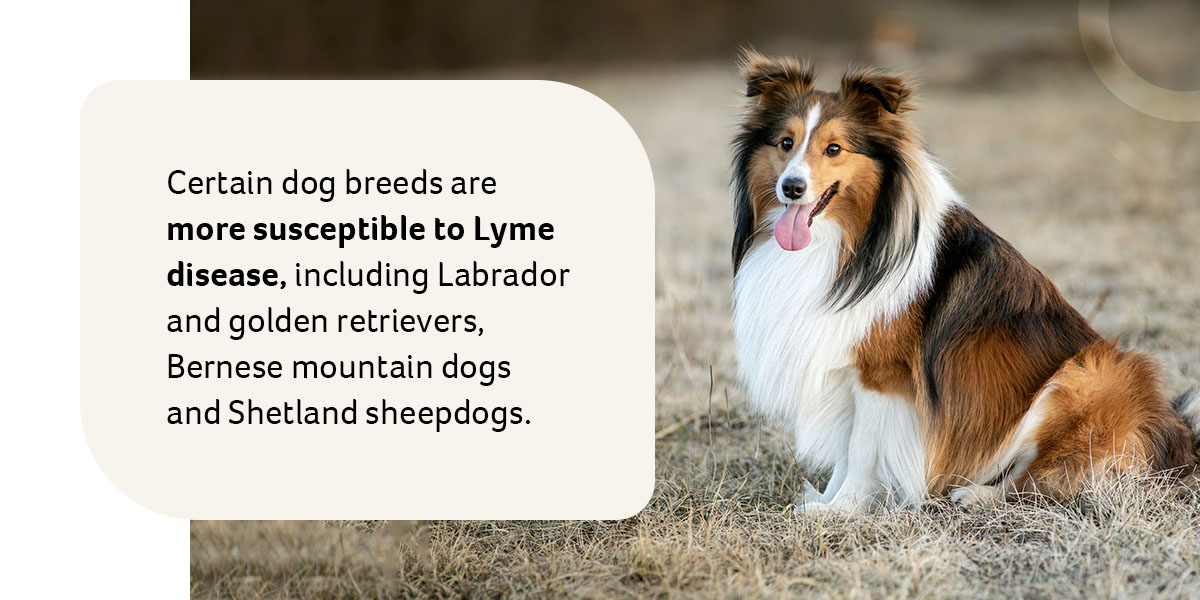
Lyme disease can affect humans and dogs and spreads through the bite of infected black-legged ticks, such as deer or bear ticks. It is one of the most common tick-borne diseases for dogs. The disease is treatable and rarely fatal, but it does cause significant pain and discomfort. In rare cases, it can result in severe kidney failure in dogs with underdeveloped immune systems. Certain dog breeds are also more susceptible to the disease, including Labrador and golden retrievers, Bernese mountain dogs and Shetland sheepdogs.
The most common symptoms of Lyme disease include:
- Lameness
- Fever
- Loss of appetite
- Bleeding
- Tiredness
- Joint swelling
- Swollen lymph nodes
The joint closest to the infected tick bite will show signs of infection first, with dogs limping and favoring this leg over others. Treatment of Lyme disease includes a range of antibiotics over four weeks.
If you live in areas where Lyme disease is endemic, you have a working dog or you spend a lot of time outdoors with your dog, regular vaccination is required. The vaccine should be given to puppies at 12 weeks, with a booster shot three weeks later. Annual boosters are recommended. You can also take other preventive measures, such as using tick collars or topical tick medication with the vaccine. Puppies might experience mild side effects, including being tired or sore at the injection site, which will pass in 48 hours or less.
Canine Influenza
The highly contagious canine influenza causes respiratory infections in dogs. Since canine flu is a relatively new disease, most dogs don’t have proper immunity to it, which increases their risk of contracting it. Most cases of canine flu are mild and easy to treat. In severe cases, dogs may also develop pneumonia.
The most common canine flu symptoms include sneezing, coughing, fever, fatigue and eye and nasal discharge. Canine flu spreads easily whenever dogs come in contact with each other. Some places dogs can catch the disease include:
- Dog parks
- Doggie daycares
- Dog classes
- Boarding facilities
- Vet offices
- Dog shows
- Groomers
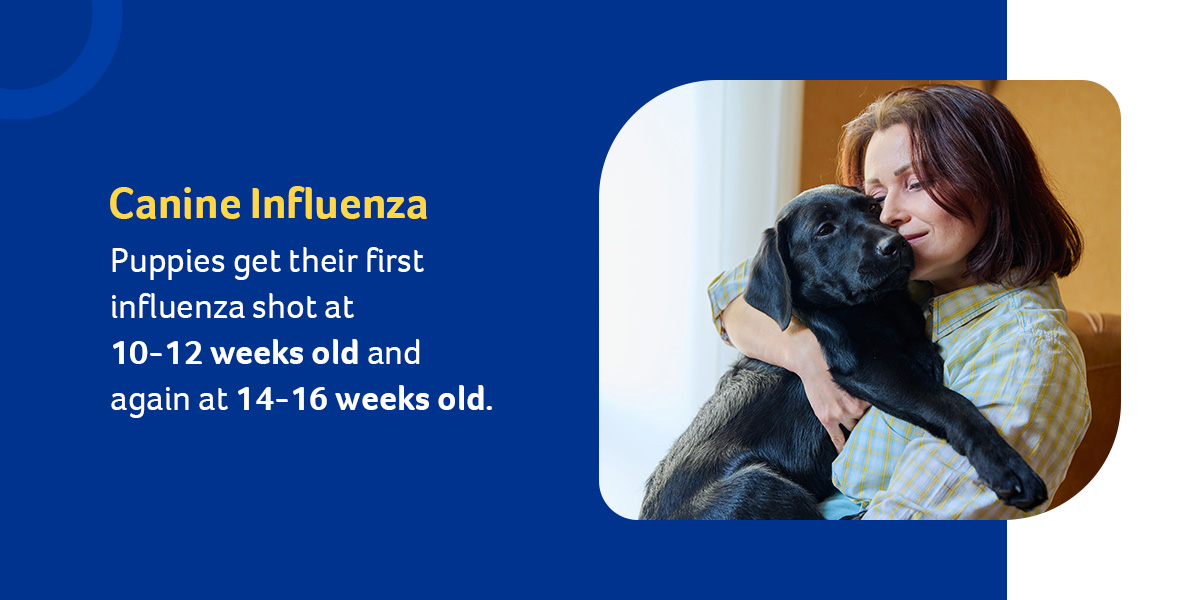
Dogs with canine flu or suspected of having it should be isolated immediately. There is no specific treatment for the flu, and it mainly involves making sure puppies are comfortable and treating any infections with antibiotics. Severe cases might require hospitalization.
Puppies get their first influenza shot at 10-12 weeks old and again at 14-16 weeks old. Annual boosters are highly recommended, particularly for dogs at high risk due to their age or preexisting respiratory conditions. As with any vaccine, puppies may experience pain at the injection site, tiredness and fever, which should all go away within 48 hours.
What Canine Diseases Don’t Have Vaccines?
Some diseases do not have vaccines, generally because they are not as fatal. These diseases may result in mild symptoms such as diarrhea or can be prevented using other measures such as parasite control. Many diseases are easily treated with antibiotics, eliminating the need for a vaccine. Heartworm and Giardia diseases don’t have a vaccine since there are other methods to treat them.
Heartworm Treatment for Dogs
Heartworm is a devastating disease for dogs, resulting in severe lung disease, heart failure and other organ damage. It is often fatal for dogs if left untreated. The parasite is transmitted by mosquitoes, which inject the larvae into the bloodstream. The larvae develop into adult worms which lodge in the heart and bloodstream, where they start to grow, restricting blood flow and usually leading to death.
You might only notice heartworm symptoms months or even years after dogs are infected. Signs that dogs have heartworm include a soft cough, breathing difficulties, weakness, fainting and weight loss. Treatment is critical to preventing death. Heartworm is treated by getting rid of all forms of the parasite — adult, larvae and pre-larvae. Dogs receive a series of injections to kill heartworm adults and antibiotics to prevent secondary infections such as pneumonia.
Because there is no vaccine to stop heartworm, prevention is essential. Vets recommend getting dogs regularly tested for heartworm due to the delay in symptoms presenting. You can give your dog monthly preventive medications to stop heartworm larvae from developing. Puppies can be started on heartworm prevention when they are under 7 weeks old.
Coronavirus Treatment for Dogs
Dogs can also get coronavirus, just not the same one that affects humans. They get canine coronavirus which is a contagious intestinal disease. On its own, it is a mild infection that is rarely lethal. However, it can become fatal if combined with any other condition, parvovirus or a parasite. Puppies over 10 weeks old may experience mild diarrhea, which can go away without intervention. In younger puppies, canine coronavirus can cause significant issues and even be fatal. Canine coronavirus is transmitted when animals ingest infected feces. It cannot spread to humans.
Symptoms of canine coronavirus in puppies include depression, lethargy, loss of appetite, vomiting and diarrhea. Unlike parvovirus, puppies will drink and keep fluids down if they have canine coronavirus. Dehydration is the biggest concern for puppies with the disease, so treatment focuses on getting fluids into the puppy. Antibiotics might be administered to prevent secondary infections.
Combination vaccines protect dogs against canine coronavirus, distemper, parvovirus and leptospirosis. Vaccines are recommended annually for breeding dogs as they provide immunity to puppies under 10 weeks old through their milk. Parasites can complicate the canine coronavirus, so have a strict parasite prevention plan in place as well.
Keep Puppies Healthy With Revival Animal Health Vaccines
Sticking to proper puppy vaccination schedules can protect them from fatal diseases and let you know when puppies are fully vaccinated. As puppies grow, they develop their immune systems and must be given the suitable vaccine at the right time to help them fight diseases. Browse Revival Animal Health’s extensive range of vaccines today to make vaccination easy!
LEARN MORE:
Cat and Dog Vaccination Guide
Does my dog need a Lepto vaccine? Is feline leukemia vaccine necessary? Learn about recommended dog vaccines and recommended shots for cats.
Dog Vaccine FAQs
What vaccines do dogs need? What are core vaccines for dogs? Learn about annual dogs shots, modified live vs killed vaccines, and more.
Dog Vaccine Abbreviations | Revival Animal Health
What does DA2PP stand for? What is the dog vaccine bordetella abbreviation? Dog vaccines come in a variety of combinations and may be identified by abbreviations. Here's a handy dog vaccination guide to help you determine what the letters stand for.
How to Vaccinate a Dog or Cat
Giving vaccines to your dog or cat can be scary at first, so it helps to be prepared. Learn the difference between subcutaneous, intramuscular and intranasal vaccines.
Written by: Marty Greer, DVM
Director of Veterinary Services
Marty Greer, Doctor of Veterinary Medicine, has 40+ years’ experience in veterinary medicine, with special interests in canine reproduction and pediatrics. She received her Doctor of Veterinary Medicine from Iowa State University in 1981. She’s served as Revival’s Director of Veterinary Services since 2019. In 2023, Dr. Greer was named the Westminster Kennel Club Veterinarian of the Year.
